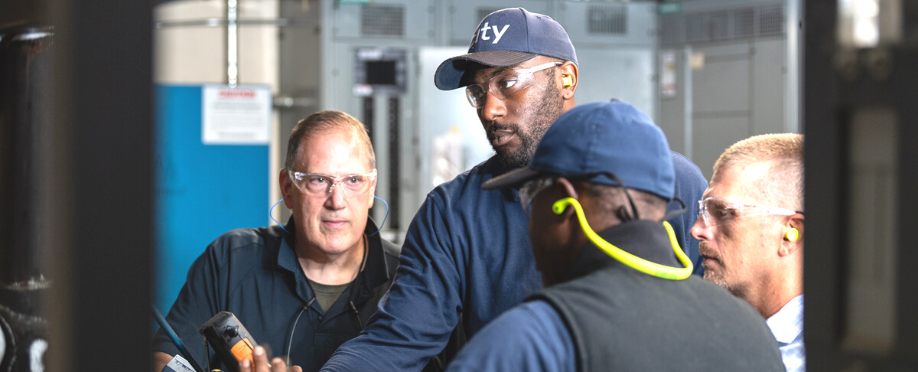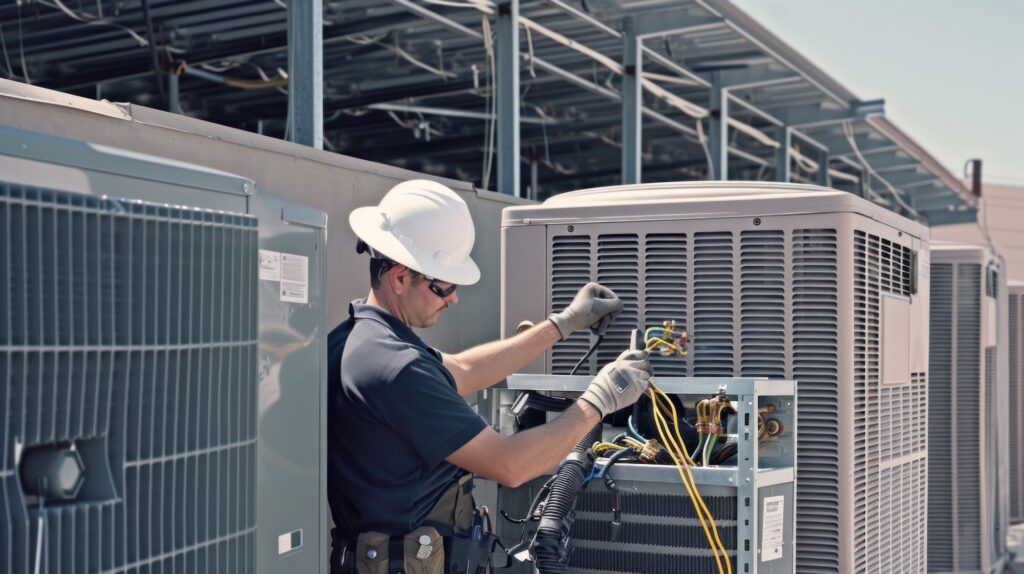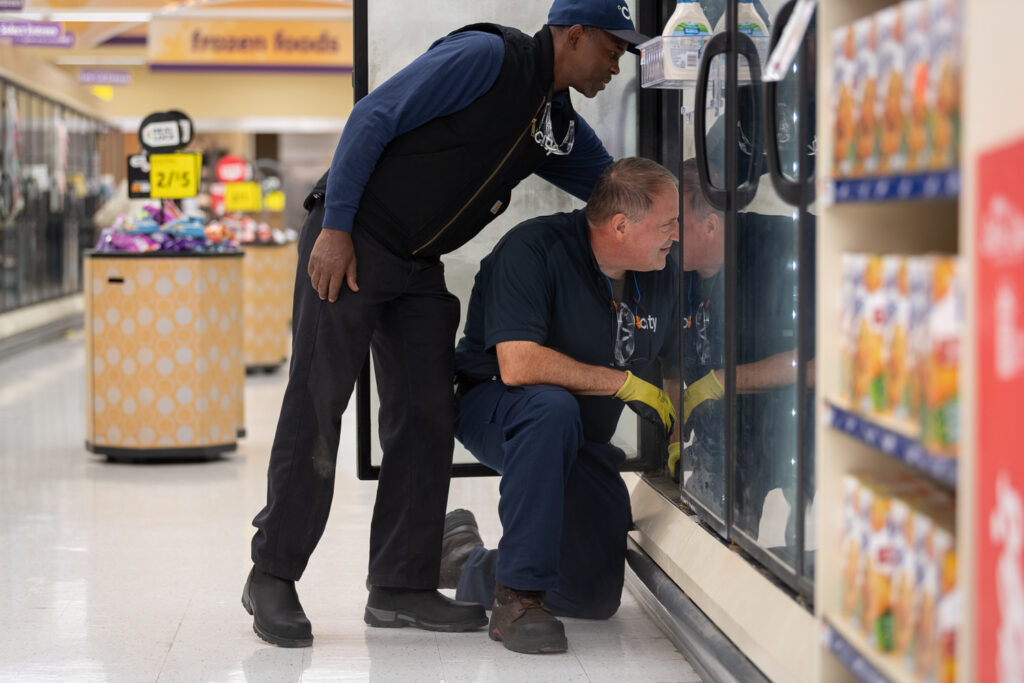
From maintaining buildings and assets to ensuring a safe and efficient workplace, facilities management teams play a vital role in the food retail space. To excel in this rapidly evolving field, continuous training is essential at all levels. At the same time, FM leaders are up against not only an unprecedented labor shortage as younger generations shy away from the technical trades, but also a less skilled labor market in need of more robust education.
These key facilities management training tips can help FM professionals enhance their own as well as their team’s skills — managerial and technical alike.
The skilled trades labor shortage
In the post-pandemic world, the facilities management industry faces a critical challenge — a shrinking and increasingly less skilled technical labor pool.
“The skilled labor shortage is a pressing concern, with many employers struggling to find qualified professionals to fill crucial roles,” says Tamara Joiner, Vice President of Human Resources at City. “In the face of an aging workforce, as seasoned technicians retire, they’re leaving behind a void that is challenging to fill without an elevated insight of the market.”
According to Construction Dive, the construction industry faces a gap of about half a million — a shortage that’s predicted to increase with stronger demand for labor as a result of the billions of dollars slated for federal infrastructure funding.
Additionally, NPR reports that the application rate for jobs in building and the trades by young people fell by 49% in 2022 compared to 2020. The news publication writes, “While Gen Z — often described as people born between 1997 and 2012 — is on track to become the most educated generation, fewer young folks are opting for traditionally hands-on jobs in the skilled trade and technical industries.”
Such a decline may not solely indicate a waning interest in technical jobs within this younger generation but may also reflect the lingering effects of the COVID-19 pandemic, during which remote education was not conducive to hands-on technical training. Either way, regardless of how much the pandemic affected the current labor market, one thing is for sure: facilities management teams are faced with far fewer and less educated technicians.

Looking ahead: skilled labor market predictions
“The current situation, based on our most recent research, is that the skilled labor market for trades in facilities management is witnessing heightened demand, fueled by the continuous advancements in technology and the increasing need for sustainable solutions,” Tamara says. “As businesses and homeowners alike prioritize energy efficiency and environmental considerations, the demand for skilled technicians in these trades has surged.”
…The skilled labor market for trades in facilities management is witnessing heightened demand, fueled by the continuous advancements in technology…Tamara Joiner, VP of HR at City
Long-term trends indicate a sustained growth in demand for skilled technicians in refrigeration, HVAC, and electrical trades specifically. The focus on green technologies, smart systems, and sustainable practices is expected to drive the need for specialized skills in these fields. “As the industry evolves, technicians who can adapt to emerging technologies will be in high demand,” Tamara says.
As the skilled labor market and the trades supporting facilities management navigate a transformative period, adapting to the evolving landscape, addressing the current challenges, and investing in training and education are crucial steps for facilities leaders to take.
Education trends
Comparing skilled technicians today with their counterparts from the past reveals a significant evolution. Today’s technicians are not only proficient in traditional mechanical skills but also well-versed in digital technologies, computerized systems, and data analytics. The integration of smart technologies in refrigeration, HVAC, and electrical systems has transformed the skill set required of technicians and made them indispensable in the modern workforce.
From a training and education perspective, the trades are adapting to new learning models in order to support this evolution in technical job requirements. Online courses, apprenticeships, and vocational programs are becoming more prevalent, providing aspiring technicians with flexible pathways to acquire the necessary skills. “The emphasis on continuous learning is crucial, given the rapid technological advancements within this industry,” says Tamara.
Facilities management training tips
With the above in mind, let’s take a look at some of the most impactful facilities management training ideas, from strengthening technical skills to enhancing leadership and operational proficiency.
Implement continuous technical training opportunities
“As most facilities management training programs are typically geared toward management-level programs, there’s a noticeable gap in addressing the training needs of technicians,” says George Campbell, who as City’s Director of Technical Services oversees technical training.
Addressing essential technical training skills can have a significant impact on asset uptime, customer experience, and overall facilities management costs by ensuring a proficient workforce that will proactively maintain assets and minimize downtime.
At City, George explains, there are five different levels of training technicians can avail themselves of as part of the company’s Level Up program. Once a year, they are given the opportunity to participate in “leveling up” their skills with study modules followed by hands-on training. Upon successful completion of both an online assessment and in-person evaluation, individuals become eligible for advancement to the next training level, accompanied by a corresponding increase in compensation.
“The program has been a success in increasing not just the skills but the morale of our techs,” George says, “Not only that, our partners and their customers benefit from a more proficient and motivated team, ensuring a higher standard of service and satisfaction.”

Emphasize simulation and practical training
While an increasing number of retailers are investing in training their employees — most commonly by partnering with trade schools — such programs tend to focus on what George calls the “book side” of training — that is, studying theoretical knowledge rather than engaging in physical, hands-on learning.
“There’s no substitute for hands-on experience in the trades and facilities management,” George says. This makes it vital for facilities to invest in training programs that incorporate realistic scenarios and hands-on exercises, whether in a specially adapted training facility equipped with the equipment they’ll be working on in the field or in the very stores they’ll be servicing. This approach allows technicians to apply their knowledge in practical situations, enhancing their problem-solving skills and decision-making abilities, ultimately leading to faster service calls and eliminating the need for callbacks.
Collaborate with local communities
While the future skilled labor market may not currently look bright, facilities management leaders can take steps today to help foster a well-trained workforce in the coming years. Such a proactive approach includes actively engaging with high schools, trade schools, student college fairs, and the like to recruit and educate a consistent influx of young talent for the trades. By participating in such outreach programs and mentorship initiatives, FM professionals can do their part to help build a steady pipeline of skilled technicians entering the field, thereby contributing to the growth of the next generation.
Train technicians in multiple disciplines
“Working with a network of vendors to solve facilities management issues can be costly and inefficient,” says George. “That’s why at City we build a workforce of what we call MSTs — multi-skilled technicians.” Distinct from maintenance staff, these are tradespeople trained to handle up to 12 facilities management disciplines — including mechanical, electric, lighting, plumbing, and carpentry. “With MSTs, you can also expect greater efficiencies, stronger customer satisfaction, and decrease costs,” George says. “It’s a gamechanger for any facilities management team.”
Similarly, encourage cross-training among non-technical facilities management staff so that team members can step in to cover critical roles when needed. This strategy reduces risks associated with personnel dependencies and promotes a supportive and less stressful work environment.
Stay updated on industry trends and new technologies
From energy efficiency upgrades to data intelligence solutions, facilities management — especially among grocers and other retailers — is undergoing unparalleled advancements and changes. Stay informed about these changes by attending industry conferences, webinars, and workshops on a regular basis. Some of the latest facilities management technology solutions, which can help streamline operations and increase efficiencies, include:
- CAFM (computer aided facility management) and CMMS (computerized maintenance software)
- AMS (asset management systems)
- EMS (energy management systems)
- IWMS (Integrated workplace management systems)
- Predictive maintenance technology
- Smart building technology
Prioritize safety training
Ensuring a safe environment is a top priority for facilities managers, especially in supermarkets and retail stores, which face higher risks due to heavy customer traffic and food safety compliance. Safety training involves staying updated on federal and local regulations, keeping abreast of health and safety best practices, and providing staff with proper training on emergency procedures. A safe workplace isn’t just crucial for protecting employees, customers, and vendors, but also the organization as a whole. It also contributes to the overall productivity and morale of the business.
Develop soft skills
Facilities managers often work with a number of teams, contractors, and stakeholders, necessitating proficiency in interpersonal or collaborative competencies. In your facilities management training, make sure to invest in a course or program that enhances soft skills such as communication, leadership, and conflict resolution.
Implement sustainable practices
Thanks to stronger consumer focus on sustainability and stricter environmental legislation, facilities management teams in food retail stores are more driven than ever to adopt green practices.
Training programs focused on sustainable facilities management strategies, such as utilizing low GWP refrigerants and other sustainable refrigeration practices, can help professionals incorporate environmentally friendly and energy-saving initiatives into their daily operations.
Master project management skills
Facilities managers often have to juggle various projects at the same time. Strong project management skills are essential for effectively planning and executing tasks. Training in project management methodologies, such as Agile or Six Sigma, can enhance a facilities manager’s ability to deliver projects on time and within budget.
Build a Well-Trained, Dedicated Integrated Facilities Management Team
By investing in continuous training — especially hands-on, where applicable — facilities management professionals can stay ahead of industry trends, ensure workplace safety, and contribute to the success of their organizations and a more sustainable world.
At City, we offer an industry-disruptive delivery system for facilities management founded on preventive maintenance that significantly delivers exceptional service and sustained cost savings. This includes building a dedicated self-perform team, which is comprised of highly trained multi-skilled technicians and customized to your business. Learn more about our integrated facilities management services.

 2016: City US is established in North America, in partnership with Southeastern Grocers (SEG), servicing over 750 supermarkets across 7 southern states.
2016: City US is established in North America, in partnership with Southeastern Grocers (SEG), servicing over 750 supermarkets across 7 southern states. 1985: Willie and Susan Haughey establish City Refrigeration Holdings (UK) Ltd in Glasgow, UK.
1985: Willie and Susan Haughey establish City Refrigeration Holdings (UK) Ltd in Glasgow, UK. 2009: City Australia launches in Melbourne, in partnership with Coles, servicing over 700 supermarkets across the country.
2009: City Australia launches in Melbourne, in partnership with Coles, servicing over 700 supermarkets across the country. 2015: City Asia launches in Kuala Lumpur, Malaysia, in partnership with Dairy Farm, servicing over 205 supermarkets across the region.
2015: City Asia launches in Kuala Lumpur, Malaysia, in partnership with Dairy Farm, servicing over 205 supermarkets across the region.